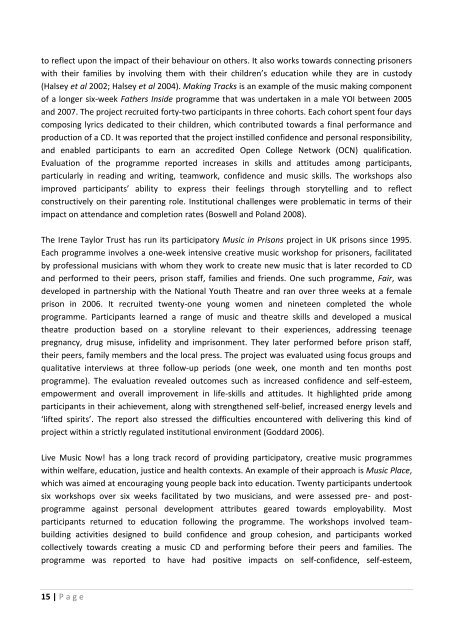De Viggiani, N., Daykin, N., Moriarty, Y. and Pilkington, P. and ...
De Viggiani, N., Daykin, N., Moriarty, Y. and Pilkington, P. and ...
De Viggiani, N., Daykin, N., Moriarty, Y. and Pilkington, P. and ...
Create successful ePaper yourself
Turn your PDF publications into a flip-book with our unique Google optimized e-Paper software.
to reflect upon the impact of their behaviour on others. It also works towards connecting prisoners<br />
with their families by involving them with their children’s education while they are in custody<br />
(Halsey et al 2002; Halsey et al 2004). Making Tracks is an example of the music making component<br />
of a longer six-week Fathers Inside programme that was undertaken in a male YOI between 2005<br />
<strong>and</strong> 2007. The project recruited forty-two participants in three cohorts. Each cohort spent four days<br />
composing lyrics dedicated to their children, which contributed towards a final performance <strong>and</strong><br />
production of a CD. It was reported that the project instilled confidence <strong>and</strong> personal responsibility,<br />
<strong>and</strong> enabled participants to earn an accredited Open College Network (OCN) qualification.<br />
Evaluation of the programme reported increases in skills <strong>and</strong> attitudes among participants,<br />
particularly in reading <strong>and</strong> writing, teamwork, confidence <strong>and</strong> music skills. The workshops also<br />
improved participants’ ability to express their feelings through storytelling <strong>and</strong> to reflect<br />
constructively on their parenting role. Institutional challenges were problematic in terms of their<br />
impact on attendance <strong>and</strong> completion rates (Boswell <strong>and</strong> Pol<strong>and</strong> 2008).<br />
The Irene Taylor Trust has run its participatory Music in Prisons project in UK prisons since 1995.<br />
Each programme involves a one-week intensive creative music workshop for prisoners, facilitated<br />
by professional musicians with whom they work to create new music that is later recorded to CD<br />
<strong>and</strong> performed to their peers, prison staff, families <strong>and</strong> friends. One such programme, Fair, was<br />
developed in partnership with the National Youth Theatre <strong>and</strong> ran over three weeks at a female<br />
prison in 2006. It recruited twenty-one young women <strong>and</strong> nineteen completed the whole<br />
programme. Participants learned a range of music <strong>and</strong> theatre skills <strong>and</strong> developed a musical<br />
theatre production based on a storyline relevant to their experiences, addressing teenage<br />
pregnancy, drug misuse, infidelity <strong>and</strong> imprisonment. They later performed before prison staff,<br />
their peers, family members <strong>and</strong> the local press. The project was evaluated using focus groups <strong>and</strong><br />
qualitative interviews at three follow-up periods (one week, one month <strong>and</strong> ten months post<br />
programme). The evaluation revealed outcomes such as increased confidence <strong>and</strong> self-esteem,<br />
empowerment <strong>and</strong> overall improvement in life-skills <strong>and</strong> attitudes. It highlighted pride among<br />
participants in their achievement, along with strengthened self-belief, increased energy levels <strong>and</strong><br />
‘lifted spirits’. The report also stressed the difficulties encountered with delivering this kind of<br />
project within a strictly regulated institutional environment (Goddard 2006).<br />
Live Music Now! has a long track record of providing participatory, creative music programmes<br />
within welfare, education, justice <strong>and</strong> health contexts. An example of their approach is Music Place,<br />
which was aimed at encouraging young people back into education. Twenty participants undertook<br />
six workshops over six weeks facilitated by two musicians, <strong>and</strong> were assessed pre- <strong>and</strong> postprogramme<br />
against personal development attributes geared towards employability. Most<br />
participants returned to education following the programme. The workshops involved teambuilding<br />
activities designed to build confidence <strong>and</strong> group cohesion, <strong>and</strong> participants worked<br />
collectively towards creating a music CD <strong>and</strong> performing before their peers <strong>and</strong> families. The<br />
programme was reported to have had positive impacts on self-confidence, self-esteem,<br />
15 | P a g e
















